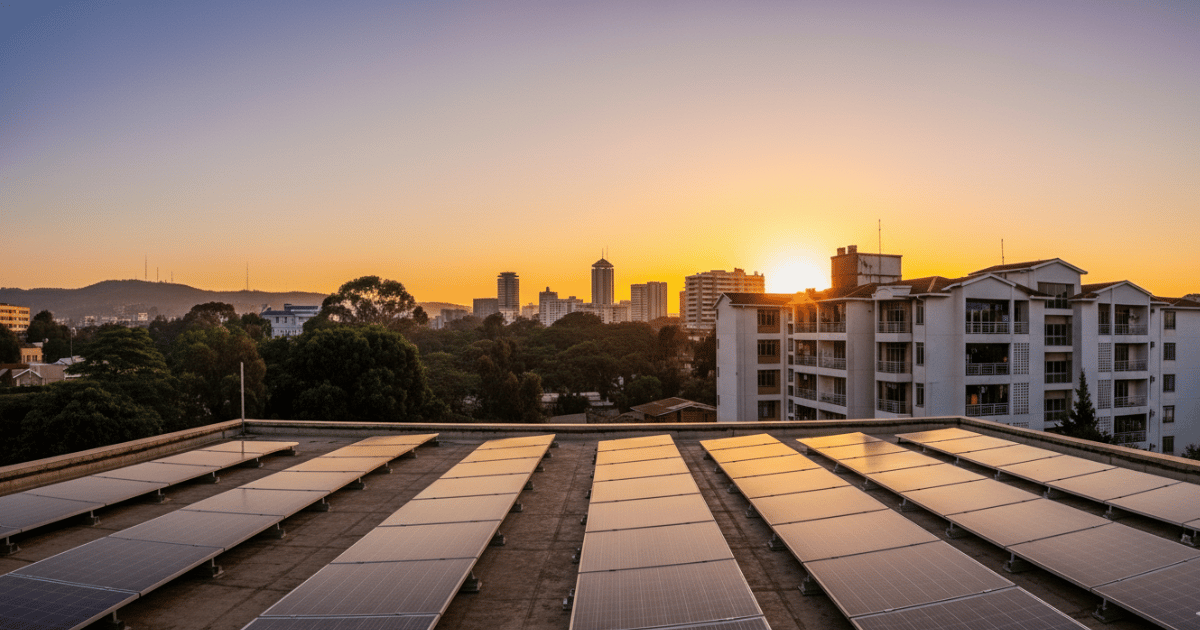- Renewables Rising
- Posts
- Kenya moves to make solar mandatory in new buildings
Kenya moves to make solar mandatory in new buildings

From the newsletter
Demand for solar is expected to grow in Kenya if a new proposal to make solar installations mandatory in all new buildings is approved by parliament. The National Construction Authority (Amendment) Bill, 2025, aims to align construction practices with environmental sustainability while accelerating the country’s transition to clean energy.
If passed, the law will empower the National Construction Authority (NCA) to designate suitable zones for solar energy systems in all new developments. The focus will be on rooftops and building areas that receive sufficient sunshine to ensure optimal generation.
This comes at a time when the push for clean energy adoption in all sectors is intensifying globally, with sustainability increasingly becoming a key investment criterion for some major project funders.
More details
The Bill is broader than just solar. It includes climate-responsive design principles such as rainwater harvesting, greywater recycling, energy-efficient technologies, and green spaces. By pushing for resilient building codes, Kenya hopes to cut emissions, reduce resource consumption, and strengthen adaptation to extreme weather patterns linked to climate change.
Kenya is not alone in pursuing building-integrated solar policies. Several other African countries have implemented similar measures to promote renewable energy adoption and reduce reliance on national grids. For example, South Africa has long had a national solar water heater programme, and its updated building regulations (SANS 10400-XA) require new buildings to meet energy efficiency standards that encourage the use of solar technologies.
Similarly, Morocco has integrated renewable energy provisions into its building codes, requiring new buildings to incorporate a percentage of their energy consumption from renewable sources, such as solar water heating. In Nigeria, the government has launched initiatives and policies to encourage the use of renewable energy. While not as widespread in building codes, the move to liberalise the market has seen many private developers and homeowners independently adopting solar.
However, Kenya’s new policy will not be without hurdles. One major challenge is cost. Developers may resist additional upfront expenses for solar zones, especially in a market where construction costs are already rising. There are also practical barriers, such as the lack of harmonised technical standards for building-integrated photovoltaics, and the need for adequate training of architects, engineers, and contractors to comply with new requirements.
To overcome these hurdles, Kenya could adopt a phased approach, beginning with large commercial buildings and urban housing projects where economies of scale make solar integration more affordable. The government could also offer tax breaks, concessional financing, or accelerated approval processes for developers who comply early.
Another solution lies in public-private partnerships, which have worked well in infrastructure projects. By involving private solar companies in co-financing rooftop systems, Kenya could lower the burden on developers while unlocking new markets for solar providers. Aligning the new policy with national net-metering or wheeling frameworks would further enhance uptake, allowing building owners to sell excess power to the grid or other consumers.
Our take
The mandatory solar zones will create a predictable demand for solar equipment. This could attract new investment into local manufacturing of solar panels and related components, reducing reliance on imports and creating jobs. KenGen, which is venturing into manufacturing, will benefit from the expected demand.
As more buildings generate their own power, the national utility, Kenya Power, will face a decline in electricity sales. The utility company will need to evolve its business model to even target this sector.
Making solar mandatory could become costly for project developers and homeowners. The government needs to introduce tax breaks and retain the current VAT exemption on solar equipment to make it less expensive.